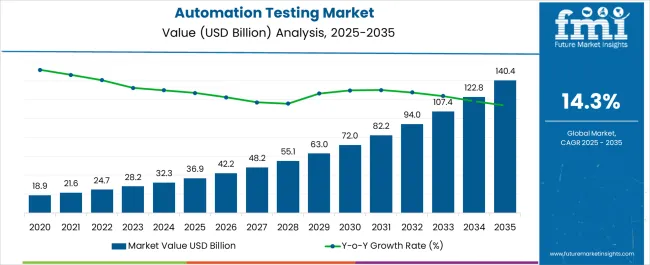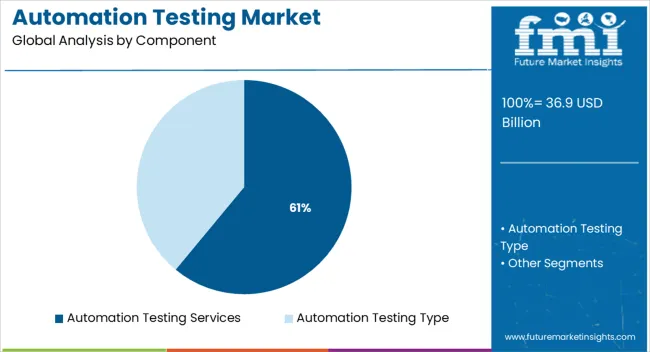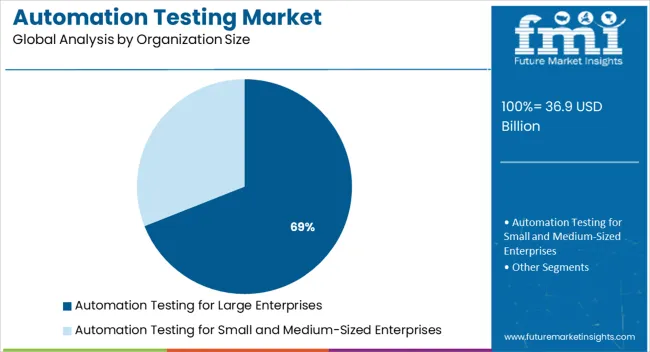The Automation Testing Market is estimated to be valued at USD 36.9 billion in 2025 and is projected to reach USD 140.4 billion by 2035, registering a compound annual growth rate (CAGR) of 14.3% over the forecast period.

| Metric | Value |
|---|---|
| Automation Testing Market Estimated Value in (2025 E) | USD 36.9 billion |
| Automation Testing Market Forecast Value in (2035 F) | USD 140.4 billion |
| Forecast CAGR (2025 to 2035) | 14.3% |
The automation testing market is advancing rapidly, driven by increasing adoption of DevOps and Agile methodologies that demand faster release cycles and higher software quality. Investments in cloud-based testing platforms, AI-powered automation tools, and continuous integration/continuous deployment (CI/CD) pipelines are accelerating market growth. Enterprises are focusing on reducing manual testing efforts to improve accuracy, efficiency, and speed.
Rising complexity of software applications and the necessity for multi-platform compatibility have emphasized automation to ensure comprehensive test coverage. Regulatory compliance, risk mitigation, and cost optimization initiatives are further fueling demand.
The integration of machine learning for predictive analytics and self-healing test scripts is expected to drive innovation. Market expansion is bolstered by growing digital transformation efforts and increased spending by large enterprises aiming to enhance software reliability and customer experience.
The market is segmented by Component, Endpoint Interface, and Organization Size and region. By Component, the market is divided into Automation Testing Services and Automation Testing Type. In terms of Endpoint Interface, the market is classified into Web Automation Testing. Based on Organization Size, the market is segmented into Automation Testing for Large Enterprises and Automation Testing for Small and Medium-Sized Enterprises. Regionally, the market is classified into North America, Latin America, Western Europe, Eastern Europe, Balkan & Baltic Countries, Russia & Belarus, Central Asia, East Asia, South Asia & Pacific, and the Middle East & Africa.

Automation testing services are projected to hold 61.0% of the overall market revenue in 2025, making this the leading component segment. This dominance is attributed to the increasing reliance on specialized service providers that offer tailored testing frameworks, continuous support, and tool integrations across diverse application environments.
The ability to scale testing operations quickly and access advanced expertise without heavy upfront investments has made these services preferable to in-house solutions for many organizations.
Moreover, the growing complexity of enterprise applications and accelerated development cycles have driven demand for outsourced services that can manage end-to-end automation testing..

Large enterprises are anticipated to account for 69.0% of the market revenue in 2025, making them the predominant customer base. This leadership is supported by their extensive software portfolios, complex testing requirements, and higher IT budgets.
Large organizations are investing heavily in robust automation frameworks that enable accelerated release cycles while maintaining compliance and quality standards.
Their focus on digital transformation initiatives and maintaining competitive advantage through continuous innovation continues to drive the adoption of automation testing solutions at scale..
The technological sector in the Asia Pacific region is booming. Countries like China, Japan, Australia, and India are the largest contributors to the demand for automation testing. Not are technological sectors maximizing the use of artificial intelligence or machine learning but also government authorities are supporting the growth of the same by launching initiatives.
Future Market Insights states that China is expected to register a CAGR of 14% for the automation testing market. this is owing to the increasing adoption of internet of things (IoT) devices along with the usage of artificial intelligence, especially in mobile applications.
India is undergoing a digital transformation which has increased the dependency on automation testing in the region. All these factors are making the Asia Pacific a lucrative region for the growth of the automation testing market.
The increasing penetration of smartphones along with the establishment of 5G services in certain geographical locations has made automation testing services easy. In addition, most end-user sectors that range from food and beverages to automotive are largely relying on the internet and web-based applications that make tasks easier and more agile.
The changing nature of end-user sectors and digitization of the same is helping industries to adapt to web-based software that helps in managing workload. In addition, mobile applications have opened doors of opportunities for testing automation in more ways than one.
The development of mobile applications is supporting treatment and refusal of automation testing owing to its ability to minimize the time during testing. With digital transformation being at the forefront of transformation, the use of automation testing is expected to grow in the upcoming years.
The rise in the adoption of artificial intelligence and machine learning in automation testing is an essential factor that is expected to accelerate market growth.
Factors such as the growth in the demand for automation of the testing process and solutions for seamless customer experience and rising usage of AI-enabled cutting-edge technologies for software testing environments are expected to propel the market growth during the forecast period.
The major factor that is expected to propel the growth of the Automation Testing Market during the forecast period includes the rapid adoption of advanced technologies.
Other major factors such as the growth in the demand for automation of the testing process and solutions for seamless customer experience and rising usage of AI-enabled cutting-edge technologies for software testing environments are expected to propel the market growth over the analysis period.
In addition, the integration of machine learning and artificial intelligence in the cloud-based automation testing tools is easing tool usage significantly which is also set to assist the market growth.
Stringent government rules and regulations are expected to hinder the growth of the Automation Testing Market during the forecast period. Moreover, the increasing complexity of implementing the transition from manual to automated testing is likely to hinder the growth of the market in the forthcoming years.
The market’s growth is further restricted by the high demand for specialized testers with the desired testing skills for test automation. While using the software, several bugs are detected. Hence, the user needs to debug the whole process before starting the operations. This procedure is lengthy. Furthermore, the automation test software needs to be operated by skilled personnel with proper training. Hence, the demand for such software is expected to be low in developing regions significantly.
Increasing adoption of mobile and web-based applications is one of the key trends that is expected to boost the market growth during the analysis period. Smartphones and the use of the internet have become indispensable components of daily life. One of the most rapidly increasing categories in the mobile and web business is software applications.
The affordability of smartphones, availability of numerous web-based applications, lower data prices, and more end-user spending power contribute to this growth of the market.
End-users download programs depending on treatment and refusal, two factors that are closely related to application performance. Furthermore, compared to other applications, the development phase and life cycle of mobile applications are quicker.
As a result, automation testing on mobile applications plays a significant part in developing the life cycle of mobile apps. Companies may enhance testing productivity, improve regression test cases, and minimize time by automating mobile application testing.
The Automation Testing Market can be segmented on the basis of Component, Endpoint Interface, Organization Size, Vertical, and region. On the basis of the Component, the market can be segmented into the following: Testing Type, and Services.
By Component, the Testing Type is further sub-segmented into the following: Static Testing, and Dynamic Testing. The Testing Type of the Automation Testing Market is expected to grow at the highest CAGR of 13.9% during the forecast period.
On the other hand, the Services Type is further sub-segmented into the following: Advisory and Consulting, Planning and Development, Support and Maintenance, Documentation and Training, Implementation, Managed Services, and Others. By Service, the Implementation services segment to dominate the market during the forecast period, owing to its capability of facilitating the integration of automation into the existing software testing infrastructure.
According to FMI, on the basis of Endpoint Interface, the market can be segmented into the following: Mobile, Web, Desktop, and Embedded Software. By Organization Size, the market is segmented into the following: Small and Medium-Sized Enterprises, and Large Enterprises.
By Organization Size, the Large Enterprises segment is to have a higher growth during the forecast period, as Automation testing services are required for enterprises to establish the smooth functioning of their business operations. These automation services are also useful to reduce operational costs and enhance customer satisfaction.
On the basis of Vertical, the market can be segmented into the following: Banking, Financial Services, and Insurance, Automotive, Defense and Aerospace, Healthcare and Lifesciences, Retail, Telecom and IT, Manufacturing, Logistics and Transportation, Energy and Utilities, Media and Entertainment, and Other Verticals.
Based on Vertical, the Banking, Financial Services, and Insurance (BFSI) sector holds a significant share and is expected to reach a CAGR of 14.2%. The adoption of digitalization in the BFSI sector is creating an important demand for automation testing of application software. However, the retail sector is set to witness the highest growth rate owing to the growing penetration of e-commerce.
The global automation testing market is divided into North America, Latin America, Europe, Asia Pacific, the Middle East, and Africa based on geography. The Asia Pacific is the most promising region as it has major economies, such as Australia, Japan, Singapore, China, New Zealand, and Hong Kong, which offer significant growth opportunities for automation testing vendors.
The region is expected to grow at the highest rate during the forecast period. This region comprises major economies like India, and China which have a very large customer base. Further, governments are taking initiatives for the rapid adoption of new technologies like AI and ML, automation, IoT, mobile and web-based applications, cloud-based services, and other technologies.
Sales of automation testing equipment in the USA are projected to reach a valuation of USD 140.4 Billion by 2035, expanding at a CAGR of 14.2%. China is expected to reach a market size of USD 5.4 Billion in 2035, representing a CAGR of 14.0%, over the forecast period. Japan and the UK are expected to reach the same market size of USD 4.7 Billion and USD 4.6 Billion in 2035, representing growth forecasts of 13.4% and 13.8% respectively, throughout the forecast period. South Korea, on the other hand, is expected to reach a market size of USD 3.4 Billion in 2035, representing a CAGR of 13.1% during the forecast period.
IBM Corporation, Micro Focus International plc., Capgemini SE, Tricentis USA Corp, SmartBear Software Inc., Parasoft Corporation, Cigniti Technologies Limited, Keysight Technologies Inc., Invensis Technologies Pvt Ltd., Sauce Labs Inc., among others are the top companies in the global automation testing market.
With a sizable automation testing market share, these main firms are concentrating on growing their consumer base in new countries. These businesses are making use of strategic collaboration initiatives to grow their market share and profits.
Mid-size and smaller businesses, on the other hand, are expanding their market presence by gaining new contracts and entering new markets, thanks to technical developments and product innovations.
The global automation testing market is estimated to be valued at USD 36.9 billion in 2025.
The market size for the automation testing market is projected to reach USD 140.4 billion by 2035.
The automation testing market is expected to grow at a 14.3% CAGR between 2025 and 2035.
The key product types in automation testing market are automation testing services, automation testing type, _static automation testing, _dynamic automation testing, _automation advisory and consulting services, _automation planning and development, _automation support and maintenance, _automation documentation and training, _automation implementation, _managed automation services and _other automation services.
In terms of endpoint interface, web automation testing segment to command 46.0% share in the automation testing market in 2025.






Our Research Products

The "Full Research Suite" delivers actionable market intel, deep dives on markets or technologies, so clients act faster, cut risk, and unlock growth.

The Leaderboard benchmarks and ranks top vendors, classifying them as Established Leaders, Leading Challengers, or Disruptors & Challengers.

Locates where complements amplify value and substitutes erode it, forecasting net impact by horizon

We deliver granular, decision-grade intel: market sizing, 5-year forecasts, pricing, adoption, usage, revenue, and operational KPIs—plus competitor tracking, regulation, and value chains—across 60 countries broadly.

Spot the shifts before they hit your P&L. We track inflection points, adoption curves, pricing moves, and ecosystem plays to show where demand is heading, why it is changing, and what to do next across high-growth markets and disruptive tech

Real-time reads of user behavior. We track shifting priorities, perceptions of today’s and next-gen services, and provider experience, then pace how fast tech moves from trial to adoption, blending buyer, consumer, and channel inputs with social signals (#WhySwitch, #UX).

Partner with our analyst team to build a custom report designed around your business priorities. From analysing market trends to assessing competitors or crafting bespoke datasets, we tailor insights to your needs.
Supplier Intelligence
Discovery & Profiling
Capacity & Footprint
Performance & Risk
Compliance & Governance
Commercial Readiness
Who Supplies Whom
Scorecards & Shortlists
Playbooks & Docs
Category Intelligence
Definition & Scope
Demand & Use Cases
Cost Drivers
Market Structure
Supply Chain Map
Trade & Policy
Operating Norms
Deliverables
Buyer Intelligence
Account Basics
Spend & Scope
Procurement Model
Vendor Requirements
Terms & Policies
Entry Strategy
Pain Points & Triggers
Outputs
Pricing Analysis
Benchmarks
Trends
Should-Cost
Indexation
Landed Cost
Commercial Terms
Deliverables
Brand Analysis
Positioning & Value Prop
Share & Presence
Customer Evidence
Go-to-Market
Digital & Reputation
Compliance & Trust
KPIs & Gaps
Outputs
Full Research Suite comprises of:
Market outlook & trends analysis
Interviews & case studies
Strategic recommendations
Vendor profiles & capabilities analysis
5-year forecasts
8 regions and 60+ country-level data splits
Market segment data splits
12 months of continuous data updates
DELIVERED AS:
PDF EXCEL ONLINE
Automation COE Market Insights by Organization Size, Service Type, End User Verticals, and Region through 2035
Lab Automation Market Growth – Size, Trends & Forecast 2025 to 2035
Home Automation Sensors Market Size and Share Forecast Outlook 2025 to 2035
Home Automation Market Analysis by Product, Application, Networking Technology, and Region Through 2035
Form Automation Software Market – Digitizing Workflows
Hyperautomation Market
Water Automation & Instrumentation Market Trends & Forecast by Process Stage, Automation Technology, Instrumentation, End-User and Region through 2035
Retail Automation Market Size and Share Forecast Outlook 2025 to 2035
Postal Automation Systems Market Size and Share Forecast Outlook 2025 to 2035
Milking Automation Market Size and Share Forecast Outlook 2025 to 2035
Process Automation and Instrumentation Market Size and Share Forecast Outlook 2025 to 2035
Network Automation Market - AI & Cloud Connectivity 2025 to 2035
Factory Automation And Industrial Controls Market Growth - Trends & Forecast 2025 to 2035
Machine Automation Controller Market Growth – Trends & Forecast 2025 to 2035
Medical Automation Market Analysis - Innovations & Forecast 2025 to 2035
Evaluating Process Automation and Instrumentation Market Share & Provider Insights
Content Automation AI Tools Market
Building Automation System Market Size and Share Forecast Outlook 2025 to 2035
Building Automation System Industry Analysis in Korea Analysis - Size, Share, and Forecast Outlook 2025 to 2035
Pharmacy Automation Market Trend Analysis Based on Product, End-Use, and Regions 2025 to 2035

Thank you!
You will receive an email from our Business Development Manager. Please be sure to check your SPAM/JUNK folder too.
Chat With
MaRIA